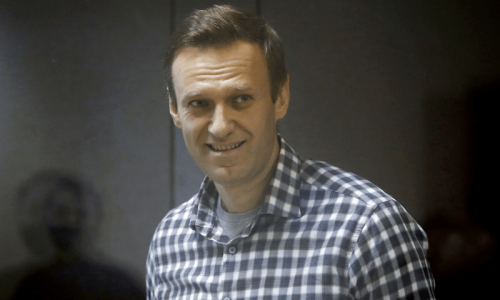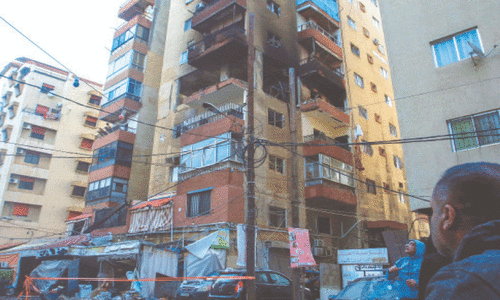Alexei Navalny, Russian President Vladimir Putin’s most formidable opponent, collapsed and died on Friday after a walk at the “Polar Wolf” Arctic penal colony where he was serving a three-decade jail term, the Russian prison service said.
The death of Navalny, a 47-year-old former lawyer, robs the disparate Russian opposition of its most courageous leader as Putin prepares for an election which will keep the former KGB spy in power until at least 2030.
There are now no opposition leaders of such prominence left in Russia. For some young urban Russians, Navalny also offered hope of an alternative future to Putin, who has served as Russia’s paramount leader longer than anyone since Josef Stalin.
Navalny rose to prominence more than a decade ago by documenting and speaking publicly about what he said was the vast corruption and opulence among the “crooks and thieves” running Putin’s Russia.
The Federal Penitentiary Service of the Yamalo-Nenets Autonomous District said in a statement that Navalny felt unwell after a walk at the IK-3 penal colony in Kharp, about 1,900 kilometres northeast of Moscow.
He lost consciousness almost immediately and died shortly afterwards despite the efforts of the prison’s medical team and ambulance staff, the prison service said. Attempts to resuscitate him failed, it said.
Navalny’s wife, Yulia, told the Munich Security Conference she could not be sure her husband was dead because “Putin and his government … lie incessantly”.
“But if this is true, I want Putin, his entire entourage, Putin friends, his government to know that they will bear responsibility for what they did to our country, to my family, to my husband,” she said.
“This regime and Vladimir Putin must bear personal responsibility for all the terrible things they have been doing to my country, to our country, Russia, in recent years.”
The Kremlin said Putin had been informed. The 71-year-old former KGB spy was shown meeting workers at a factory in Chelyabinsk, in the Ural mountains.
Western leaders paid tribute to Navalny’s courage as a fighter for freedom. Some, without citing evidence, accused the Kremlin of murder and said Putin should be held accountable for the death.
“His death in a Russian prison and the fixation and fear of one man only underscores the weakness and rot at the heart of the system that Putin has built. Russia is responsible for this,” US Secretary of State Antony Blinken said shortly before meeting Navalny’s wife in Munich.
Murder accusation
Navalny’s movement was outlawed and most of his senior allies now live in exile in Europe. His team said it had no confirmation of his death but cast the prison service’s statement as a murder confession.
“We have no reason to believe state propaganda,” Leonid Volkov, Navalny’s chief of staff, said.
“If this is true, then it’s not ‘Navalny died’, but ‘Putin killed Navalny’.”
Navalny’s lawyer was on his way to the tough penal colony where Navalny was serving sentences that would have kept him in prison beyond the age of 70.
Russian state television showed a press conference by the central bank chief as the news broke.
To supporters, Navalny was a future leader of Russia who would eventually walk free to take the presidency, though many opposition activists had expressed fears that he was in grave danger in the Russian prison system.
Navalny earned admiration from Russia’s disparate opposition for voluntarily returning to Russia in 2021 from Germany, where he had been treated for what Western laboratory tests showed was an attempt to poison him with a nerve agent.
Navalny said at the time that he was poisoned in Siberia in August 2020. The Kremlin denied trying to kill him and said there was no evidence he was poisoned with a nerve agent.
There are no opposition leaders of such prominence left in Russia. Grigory Yavlinsky, a veteran liberal, called Navalny’s death a tragedy that showed the need for reform and said he feared for the health of other opposition activists in jail.
In Moscow, at a memorial to the victims of Soviet political repression in the shadow of the former KGB headquarters, some people laid roses and carnations.
Police looked on.
One note read: “Alexei Navalny — we remember you.”
Russia’s future
Navalny long forecast Russia could face seismic political turmoil because he said Putin built a brittle system of personal rule reliant on corruption.
Navalny vented his anger at the Russian elite for its venality in 2023, expressing hatred for those who squandered a historic opportunity to reform after the 1991 fall of the Soviet Union.
“I can’t stop myself from fiercely, wildly hating those who sold, pissed away, and squandered the historical chance that our country had in the early nineties,” he said.
“I know that Russia will have another chance. This is a historical process.”
The Kremlin dismissed Navalny’s accusations of vast corruption and about Putin’s personal wealth.
Russian officials cast Navalny as an extremist who was a puppet of the Central Intelligence Agency, which they say is intent on sowing chaos and turning Russia into a client state of the West.
A day before his death, Navalny peered through a barred window, laughing and cracking jokes about his depleting funds and the judge’s salary.
“Your honour, I will send you my personal account number so that you can use your huge salary as a federal judge to ‘warm up’ my personal account, because I am running out of money,” he said via video link.
When demonstrations against Putin flared in December 2011, after an election tainted by fraud accusations, he was one of the first protest leaders arrested.
In an interview in Moscow in 2011, Navalny was asked by Reuters if he was afraid of challenging Putin’s system.
“That’s the difference between me and you: you are afraid and I am not afraid,” he said.
“I realise there is danger, but why should I be afraid?”















































